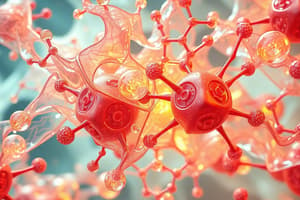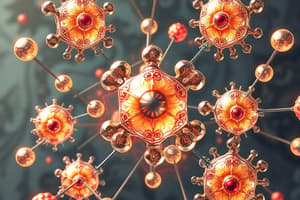Podcast
Questions and Answers
Who is largely attributed with the discovery of cells?
Who is largely attributed with the discovery of cells?
- Robert Hooke (correct)
- Anton van Leeuwenhoek
- Theodor Schwann
- Rudolf Virchow
What is the role of viruses in relation to cell theory?
What is the role of viruses in relation to cell theory?
- Viruses are considered as the smallest unit of structure in organisms
- Some biologists consider viruses as living organisms, challenging the first tenet of cell theory (correct)
- Viruses are universally accepted as non-living entities
- Viruses are believed to have originated from cells
What is the first tenet of cell theory?
What is the first tenet of cell theory?
- Cells are the basic unit of structure in all organisms
- All cells come from pre-existing cells
- Organisms are made up of cells (correct)
- Cells are the basic unit of reproduction
What technological advancement enabled the discovery of cells?
What technological advancement enabled the discovery of cells?
Who proposed that all cells come from pre-existing cells?
Who proposed that all cells come from pre-existing cells?
What type of bonding generally holds solids together?
What type of bonding generally holds solids together?
How do molecules in solids move, according to the kinetic molecular theory?
How do molecules in solids move, according to the kinetic molecular theory?
What are the two main categories of solids?
What are the two main categories of solids?
What is the defining characteristic of amorphous solids?
What is the defining characteristic of amorphous solids?
What is the smallest repeating pattern of crystalline solids called?
What is the smallest repeating pattern of crystalline solids called?
Flashcards are hidden until you start studying
Study Notes
Discovery of Cells
- Robert Hooke is largely credited with the discovery of cells through his observations of cork in 1665.
- Antonie van Leeuwenhoek later observed living cells using a microscope he designed.
Cell Theory and Viruses
- Viruses challenge traditional cell theory as they do not consist of cells and cannot reproduce independently without a host cell.
- Despite this, viruses are recognized for their role in infecting cells and influencing biological processes.
Tenets of Cell Theory
- The first tenet of cell theory states that all living organisms are composed of one or more cells, establishing the fundamental unit of life.
Technological Advancements
- The invention and improvement of the microscope enabled the discovery and study of cells, allowing scientists to observe their structures and functions.
Origin of Cells
- Rudolph Virchow proposed that all cells arise from pre-existing cells, emphasizing the continuity of life through cellular replication.
Bonding in Solids
- Ionic and covalent bonding are the primary types of bonding that generally hold solids together, contributing to their stability and structure.
Kinetic Molecular Theory
- According to the kinetic molecular theory, molecules in solids vibrate in fixed positions but do not move freely, determining their solid state.
Categories of Solids
- Solids are categorized into two main types: crystalline solids, which have a well-ordered structure, and amorphous solids, which lack long-range order.
Amorphous Solids
- Amorphous solids are characterized by their irregular arrangement of molecules, preventing them from forming a defined geometric shape.
Crystalline Solids
- The smallest repeating unit within crystalline solids is known as the unit cell, which defines the overall structure of the crystal lattice.
Studying That Suits You
Use AI to generate personalized quizzes and flashcards to suit your learning preferences.




